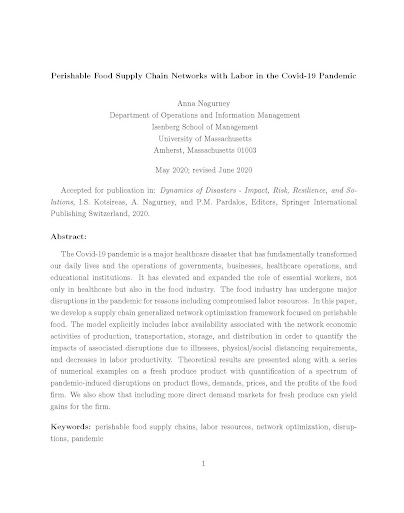It is often said that challenges bring new opportunities and that has never been clearer than in the historic Covid-19 pandemic that we are all experiencing in 2020.
With the World Health Organization officially declaring the pandemic on March 11, 2020, our lives and economies have been transformed. Of specific concern has been the viability of various product supply chains from food to PPEs (personal protective equipment) due to a spectrum disruptions.
As a researcher, who focuses on network systems, including supply chain networks, and with collaborators around the globe, it became apparent even earlier in 2020 that we would be faced with a healthcare disaster of an epic scale. And, unlike other types of disasters, from earthquakes to hurricanes and tsunamis, this is a disaster not limited in time or geography. On March 12, 2020, I published an article in The Conversation: How coronavirus is upsetting the blood supply chain, which is my most read article on this site and has been reprinted multiple times. It emphasizes how important safety and labor are and also presages the possible use of convalescent plasma, which has been used in numerous patients suffering from Covid-19, although fully randomized clinical trials are still ongoing. And, with Dr. Pritha Dutta of Pace University, we have published several papers on blood supply chains and also completed the paper, "A Multiclass, Multiproduct Covid-19 Convalescent Plasma Donor Equilibrium Model." This Conversation article was cited on the first page of a major memo that I am honored and humbled has actually influenced policy.
Getting back to the labor issue - this has been something that I have been obsessing about for a few years and, perhaps fueled by adrenaline, along with the need, the modeling aspects fell into place. My first paper integrating labor into supply chain networks, which enables the quantification of disruptions in the form of labor shortages, which has been a big and very painful issue in a variety of food supply chain networks, ranging from fresh produce (illnesses among migrant workers) to meat processing plants (numerous cases of Covid-19), has now been accepted for publication. The paper, "Perishable Food Supply Chain Networks with Labor in the Covid-19 Pandemic," will appear in Dynamics of Disasters - Impact, Risk, Resilience, and Solutions, Springer International Publishing Switzerland. This volume is nearing completion and is the third in a series that I have co-edited with Ilias S. Kotsireas and Panos M. Pardalos.
Related subsequent work has addressed labor in healthcare supply chains, including PPEs, using system optimization, followed by a game theory framework. Shortages of medical supplies in the pandemic and competition for such critical supplies was the topic of another recent article of mine, also published in The Conversation: The raging competition for medical supplies is not a game, but game theory can help. This article highlights the paper, "Competition for Medical Supplies Under Stochastic Demand in the Covid-19 Pandemic: A Generalized Nash Equilibrium Framework," that I wrote with Mojtaba Salarpour, a PhD student of mine, and Professor June Dong of SUNY Oswego as well as Professor Pritha Dutta of Pace University. The paper has been accepted for publication in: Nonlinear Analysis and Global Optimization, Themistocles M. Rassias, and Panos M. Pardalos, Editors, Springer Nature Switzerland AG.
We have also been conducting research on stochastic multistage game theory supply chain network models for disaster relief. The first such paper of ours, "A Stochastic Disaster Relief Game Theory Network Model," co-authored with Mojtaba Salarpour and Professor June Dong and Professor Ladimer S. Nagurney of the University of Hartford, appeared in the new journal: SN Operations Research Forum. We are continuing our research on such topics, with the goal of extending both methodology and applications.
And, with collaborators in Italy, specifically, Professor Patrizia Daniele, we continue to work on problems related to human migration, which also is a big topic being covered in the news media during this very painful pandemic. One of our migration network papers, "Human Migration Networks and Policy Interventions: Bringing Population Distributions in Line with System-Optimization," appears in the January 2021 issue of the International Transactions in Operational Research. Hoping that there will be vaccines available to all then as well as effective medical treatments for Covid-19.
And for those of you who have the time and inclination, please, feel free to view my INFORMS Practice webinar: Blood, Sweat, & PPEs: Rescuing Perishable Product Supply Chains & Impacting Policy Through Analytics.






















